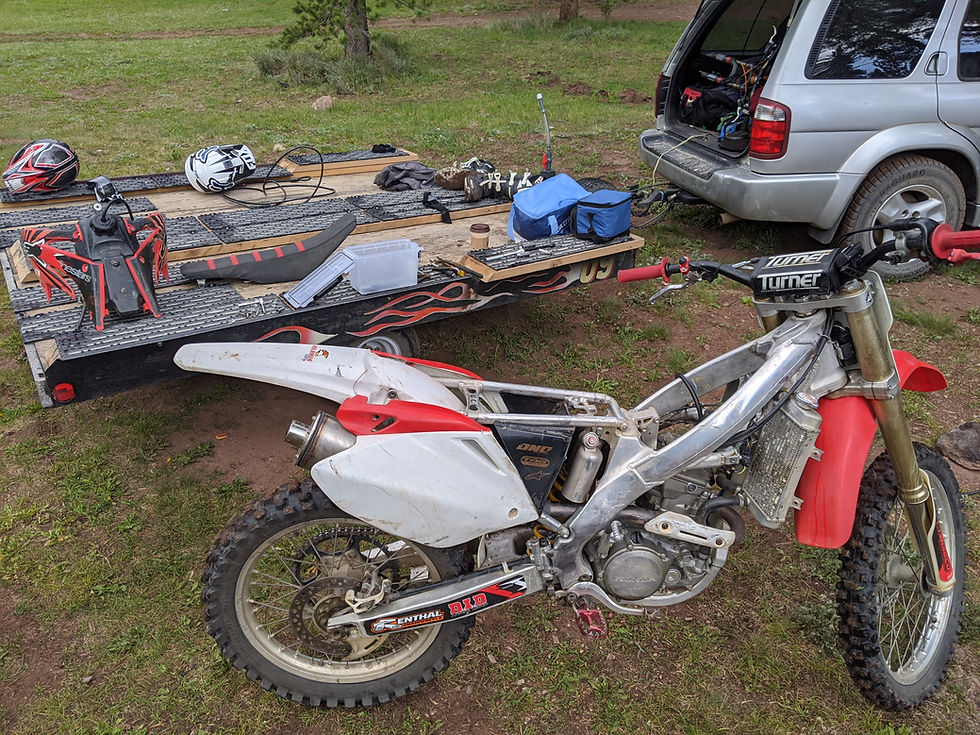CRF250R Trail Bike Conversion (CRF250X)
- KulAdventures
- Jul 1, 2020
- 3 min read
Updated: Jun 23, 2021
Like many people out there I found it easier to pick up a CRF250R as there are more out there on the market, but on my first trip into the Colorado Rockies and Black Hills I found the CRF250R to be lacking in trail riding ability. I decided instead of searching for a CRF250X or WR250 I would do some modifications to mine to make it more of a trail bike than a typical R.

Differences between 2004 Honda CRF250R and 2004 Honda CRF250X:
CRF250R CRF250X
Engine: High Comp/Agg Cam Lower Comp/Milder Cam
Flywheel: 18oz (16oz) 20oz
Trans: Close Trans Ratio Wide Trans Ratio
Sprokets: 13/51 14/53
Suspension: Stiff Racing Valving Trail Riding Valving
Starter: Kick only Kick/Electric
Protection: None Radiator/Skid Plate
Kickstand: No Yes
Dry Weight: 206 lbs 227 lbs
Gas Capacity: 1.9 Gallons 2.5 Gallons
HP/Torque: 42 HP/21.54 ft-lb 30 HP/17.85 ft-lb
After my first hard trail ride (Wheeler Lake, Colorado) I found that the R really bogged and wanted to stall on the low end, requiring a lot of clutching to keep it moving. I didn't have the low end power to chug up rocky sections. It still wanted to fly at high RPM, but really struggled at low RPM crawling speeds so I set out to fix it.
Changes I made:
Swapped the front and rear sprockets out to 12 tooth front and 53 tooth rear
Rekluse Z-Start Pro Auto Clutch Install (write up on that process here)
Installed a CRF450R Muffler for the Spark Arrstor (FMF version with Spart Arrestor)
Installed Flatland Aluminum Radiator Guards (Amazon Version)
Installed Flatland Aluminum Skid Plate (Amazon - Devol Version / Acerbis Version)
Turned the rear suspension softer, Low Compression 15 turns out, High Compression 1 turn out, Rebound 15 turns out.
Turned the front fork softer, Compression 22 turns out, Rebound 8 turns out
Changes I would like to make:
Heavier Flywheel or Flywheel weights
The biggest changes came from the suspension adjustments (still a work in progress). This is defiantly something that you need to play with. When I first rode trails the rear suspension was kicking me out of my seat over rollers, turning down the compression and rebound on the rear shock fixed that. You can read peoples suggestions on suspension settings, but since it is so easy to adjust I would just spend some time riding and adjusting till it feels good.
The sprocket made a big improvement on rock crawling at Wheeler lake trail. Some of the difficult sections really needed lower end power without the ability to clutch your way up it. I think the Rekluse auto clutch would have really helped here. Although that is a really big cost I think that is going to be worth the money. It also seems that most people do either flywheel weight or rekluse clutch as they both are addressing the low end stalling issue. Ill update once that change is done to my bike.
I was also riding at 12,000'+ so re-jetting was required, make sure you know the elevation as there will be significant bog if you are not jetted properly at 10,000' and plan on going up to 12,000'.
Although I had no bad falls or rock hits that would require the skid plate/radiator guards, those are both ways to end the trip real quick and being in a remote area with a leaking radiator can be pretty problematic (unless you can roll back down hill haha). Worth spending the money on armor. I did not have hand guards on my list, but also something to consider.
Lastly I cant make a list for trial riding without adding tools to bring along (at least to the trail head). On a trail near Almont, Colorado my bike took a dip in a creek and took on water and if I wasn't able to borrow a spark plug wrench from a fellow rider/camper then I would have been out of luck till I got home. Here is my suggested MINIMAL tool list.
TOOLS:
Flathead screwdriver (small one if you do not have a remote idle/fuel screw)
Motor Oil and something to drain into (if you take on water, oil needs to be drained)





Comments